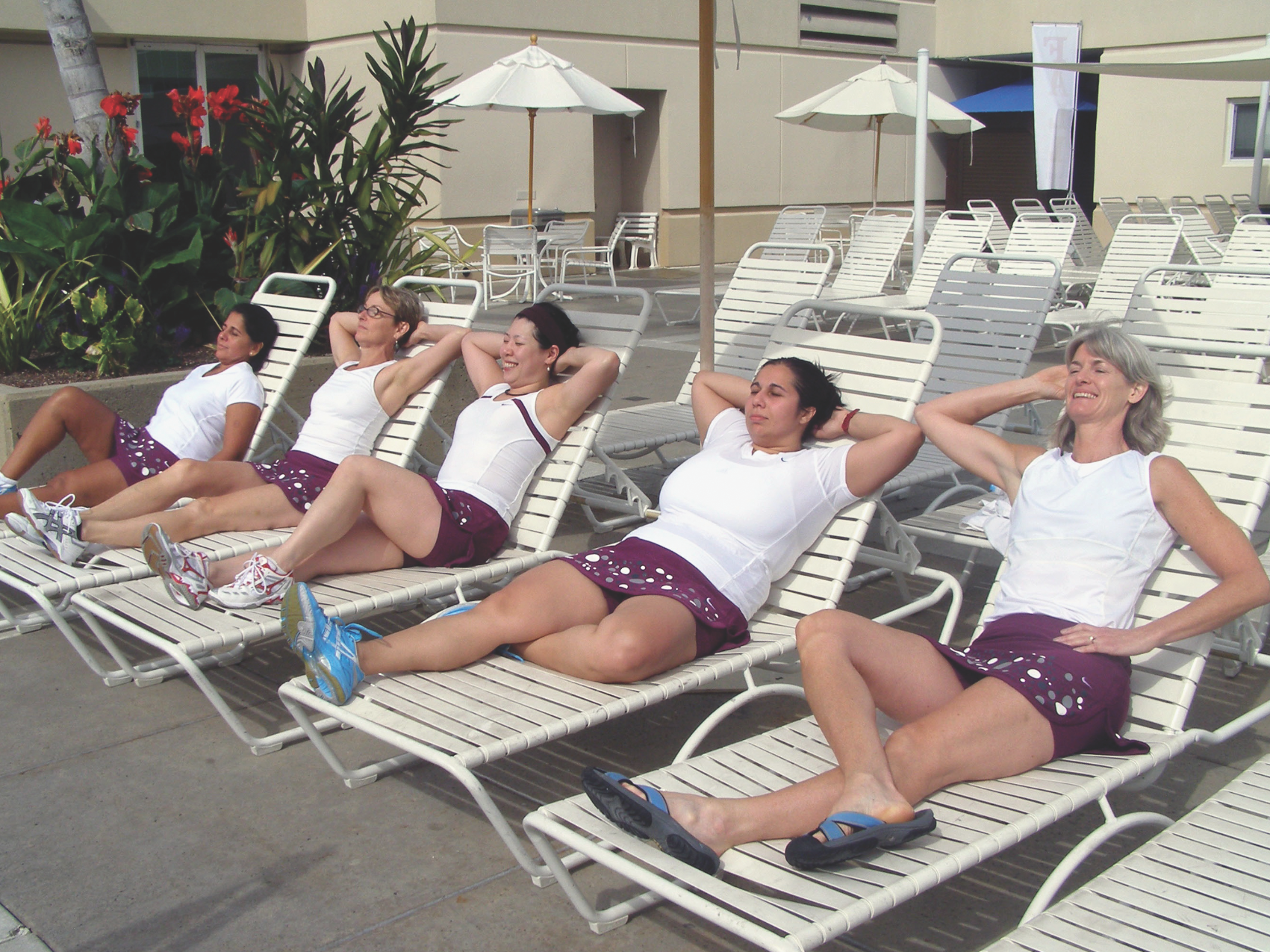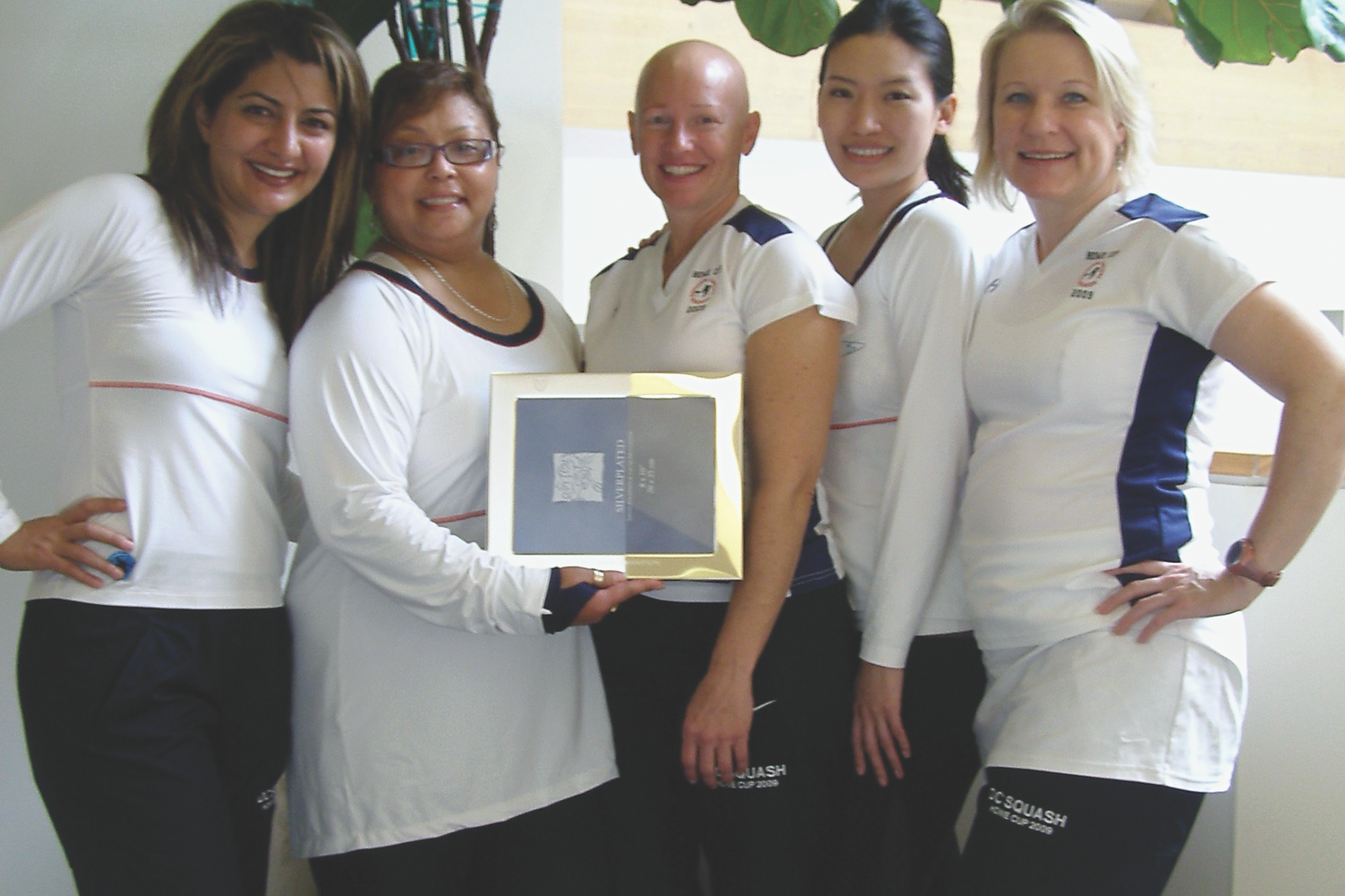
(L-R) Noushin Zarkesh, Mona Evans, Wendy Hall, Michelle Kim, and Christine Tezak.
By Beth Rasin
The courts were packed, the food was plentiful, the players were joyous and the Saturday night party was a dancing scene. In the squash world, that means only one thing—Howe Cup! Hosted by NorCal, the 71st rendition of the women’s national team championships featured the added bonus of balmy weather and a multitude of enthusiastic West Coast players who were delighted to have the most popular women’s squash event in their own backyard.

Tournament organizer Kim Clearkin, in addition to seeing to all the tournament logistics, assembled and coached the 40 California women who competed, 35 of whom were playing in their first Howe Cup. “This is an unprecedented number of women squash players from the area and a culmination of a lot of effort in training and mentoring,” said Clearkin after the tournament. Even though the B team on which Clearkin played won the Cup, she said her proudest moment was, “when all the California players filled court three for a photo at the end of the tournament. The realization of how women’s squash in California has grown in two years from one team to eight and how this competition has been a springboard for development of the women’s game in this area.”
The Seattle contingent, always strong regardless of locale, boasted six teams and the most fashion forward outfits, assembled by fashionista Lulu Chou. The Khans had the largest family showing with sisters Shabana, Mumtaz, Shanaz and sister-in-law, Maureen, competing while brother/husband Azam coached. There were a few mother/daughter combos and sister duos and perhaps the largest assemblage of Howe Cup novices. The youngest player was 11; the oldest in her 60s. The entire country was represented with teams from Connecticut, Boston, Minnesota, Cinncinnati, DC, Philadelphia and Portland in the mix.
After three days of competition among the 31 teams and 155 players, a clean sweep of the four division titles by west coast squads was precluded by the National Capitol Squashers defending their D championship. Seattle claimed the A and C titles while California took bragging rights in the Bs.
Seattle Siezes A Trophy
The Howe Cup A division was representative of the unique essence of Howe Cup with teenagers, collegians, 20-somethings and even older veterans playing gutsy and sporting squash. After the Philadelphia-Stanford University match, in which one of his players found herself competing against US Squash Hall of Famer Demer Holleran, noted particularly for her precision shot- making and strategic play, coach Mark Talbott remarked with a smile, “I don’t think my players have ever seen squash like this. This is a real learning experience for the Stanford players.”
The Seattle team, undefeated in the five team round robin, featured two veterans, two collegians and one junior. The championship deciding match, in which multiple title holder Philadelphia gave the eventual champs a real run for the title, saw four matches going to the limit. Vassar player and Seattle No. 5, Emilie Kraft, whose mother Dominique Posey was playing for the Seattle B’s, got her team off to a winning start when she held off a determined Julie Kessler. After winning the first two games, Kraft needed to regroup to win the fifth game 11-8. At the No. 4 spot, Yarden Odinak, a U. Penn freshman who represented the US at the Junior Women’s World Championships this summer, wrested a fifth game victory from Philadelphia veteran Amy Milanek.
Three-time collegiate All-American Kristen Lange, Seattle’s No. 1 player, recovered from an 0-2 deficit to defeat Kelsey Engman decisively in the final three games, 11-3, 11-3, 11-4. Wesleyan coach Shona Kerr, who stepped in to fill the Seattle No. 3 spot at the 11th hour, defeated Sue Lawrence in four games. One of the tournament highlights was the match at the No. 2 spot, featuring long time competitors Shabana Khan and Demer Holleran, with the 30-time national champion Holleran defeating her former US national teammate 11-8 in the fifth.
A Order of finish: 1. Seattle 2. Philadelphia 3. California 4. Stanford 2 5.Stanford 1
Host Californians Grab Bs
“There was much smack talk in the bar at O’Neills on Saturday night when we knew it was two California teams in the final,” said Kim Clearkin, California’s B1 captain. “I always thought the final would be close and I was convinced it would be down to the number one’s, that is, myself and Amy Lee. After all, I had a major hand in forming those teams so I knew the relative merits of all the players. But kudos to my teammates. They always made sure the match was won before I finished my game.”
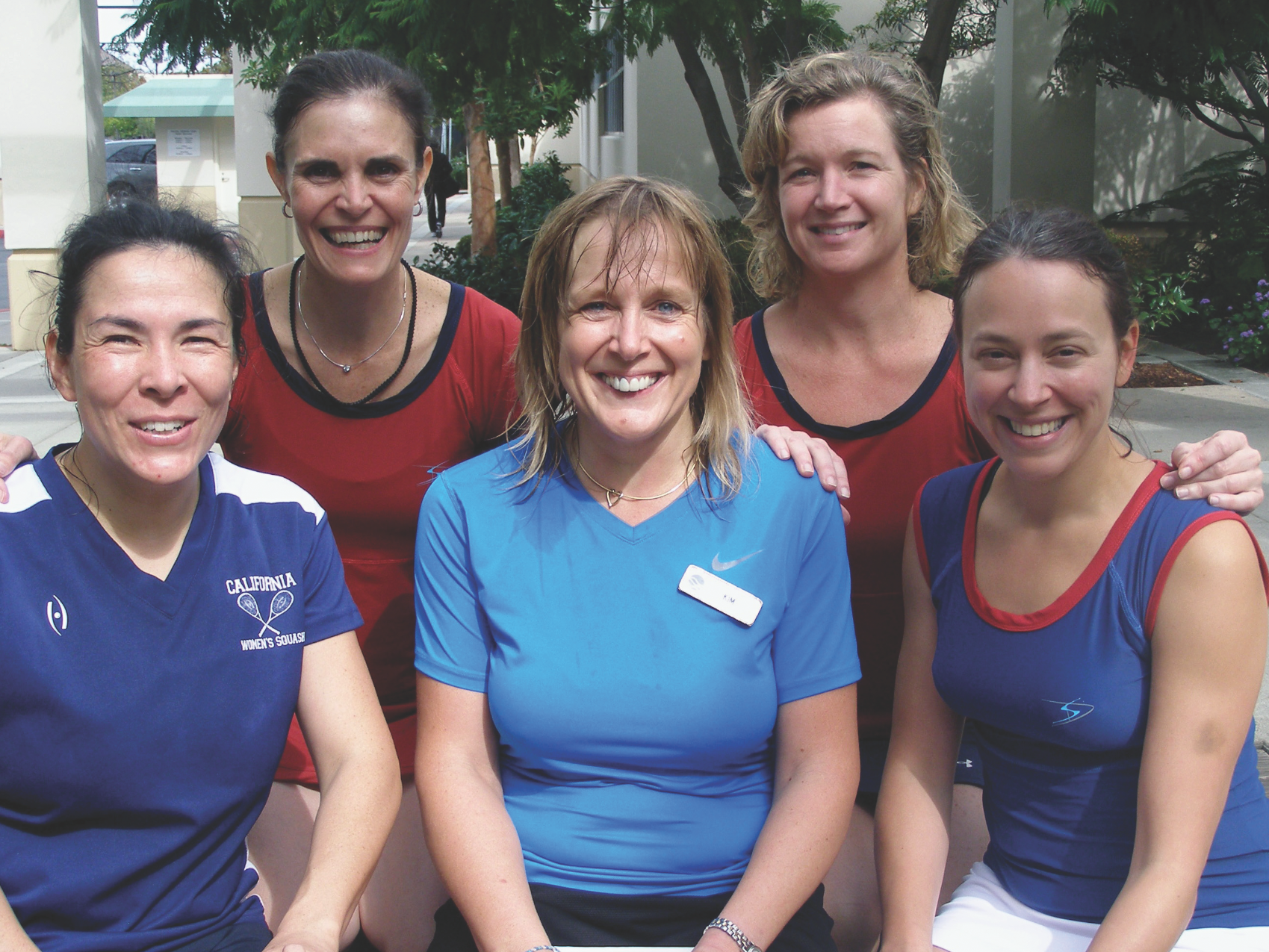
The California B1 team made their way through the draw by defeating Minnesota and then taking out Seattle 4-1 in the semifinals. The California B3 team defeated the top seeded National Capital team before dispatching the California B2 team, 3-2.
The California 3 team got on the scoreboard early as Ruth Hyndman stayed strong to defeat Rita Vanderaa in four games. Marita Louw started the California 1 team on their victory march when she evened the score by defeating Blakely Vermele in four closely fought games. Astrid Terry showed her mettle by winning the frst two games of her match against Elizabeth Bride in a tiebreak and then closed the match out 11-6 in the third. Nathalie de Champlain secured the team win and remained undefeated for the tournament when she defeated Virginia Grant in three straight games. Kim Clearkin put the icing on the victory cake with a straight game victory as well against Amy Lee.
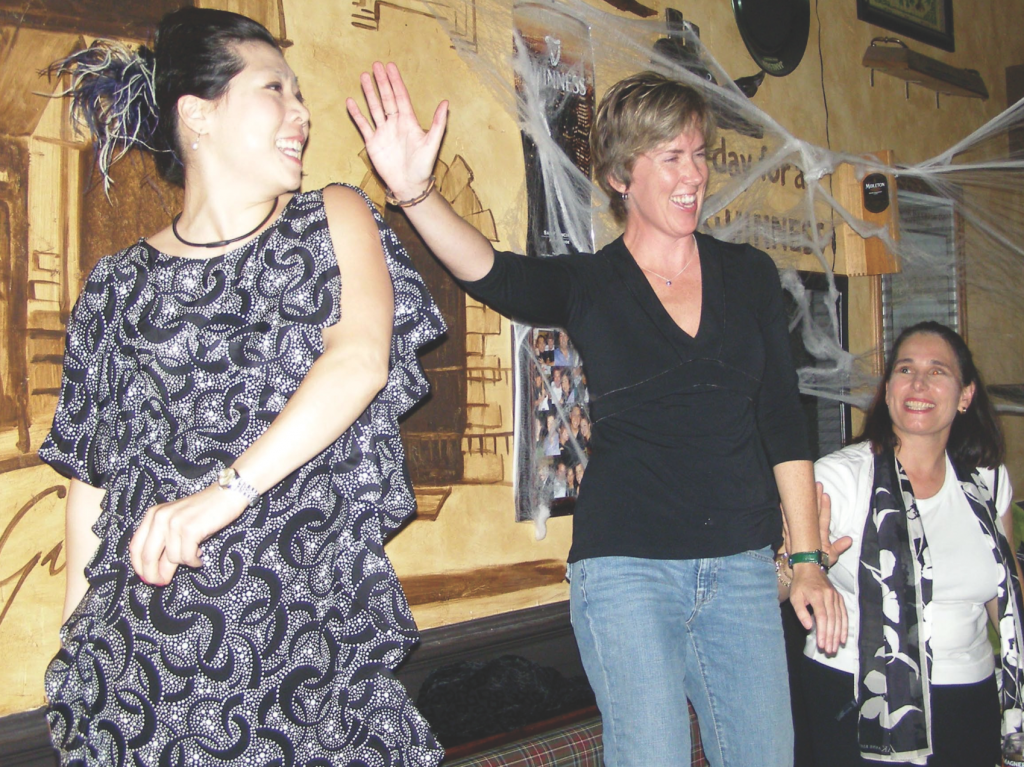
The winning team represented the global diversity that has also become a hallmark of Howe Cup—Brit Clearkin, French-Canadian Nathalie Dechamplain, Jamaican Astrid Terry, South African Marita Louw and Dutchwoman Rita Vanderaa are all California transplants united by their passion for squash and now Howe Cup converts. “We will be defending our title next year wherever the Howe Cup is held,” Clearkin exclaims. “We will not relinquish it without a fight!”
B order of finish: 1.California 1 2.California 3 3.Seattle 4.California 5.National Capital 6. SF Bay Club 7.Philadelphia 8.Minnesota 9.Aztex Bostonians 10.Connecticut 11. Seattle 2
Seattle Cinches Cs for Second Year Running
The Seattle C team successfully defended its 2008 Howe Cup title, with Julie Santos anchoring the team with her championship experience from the prior year. Julie was justly proud of her teammates who were new to Howe Cup, but fearless in their pursuit of the title which they defended with a 3-2 victory over California 2.
Seattle defeated Portland and Philadelphia enroute to the finals while California 2 took out the Portland Mir Cats (presumably so named because former national champion Moshen Mir was their coach) and California 3. In the championship match, California 2 notched the first point when Seattle No. 5 Elaine Friedland lost a five game nailbiter to Sabine Mueller. After dropping the first game, Seattle’s Heather Thomson rebounded to put her team on the scoreboard with a four game win over Stefanie Elkins. When Julie Santos went down in three to Gwyneth Terry, it was all on the shoulders of two 16-year olds—Catherine Toyoshima who showed no sign of nerves in an authoritative 11-6, 11-6,11-0 victory over Yvonne Wu while Caroline Sargent clinched the Cup for her team with a five game victory over Jacinta Corbett.
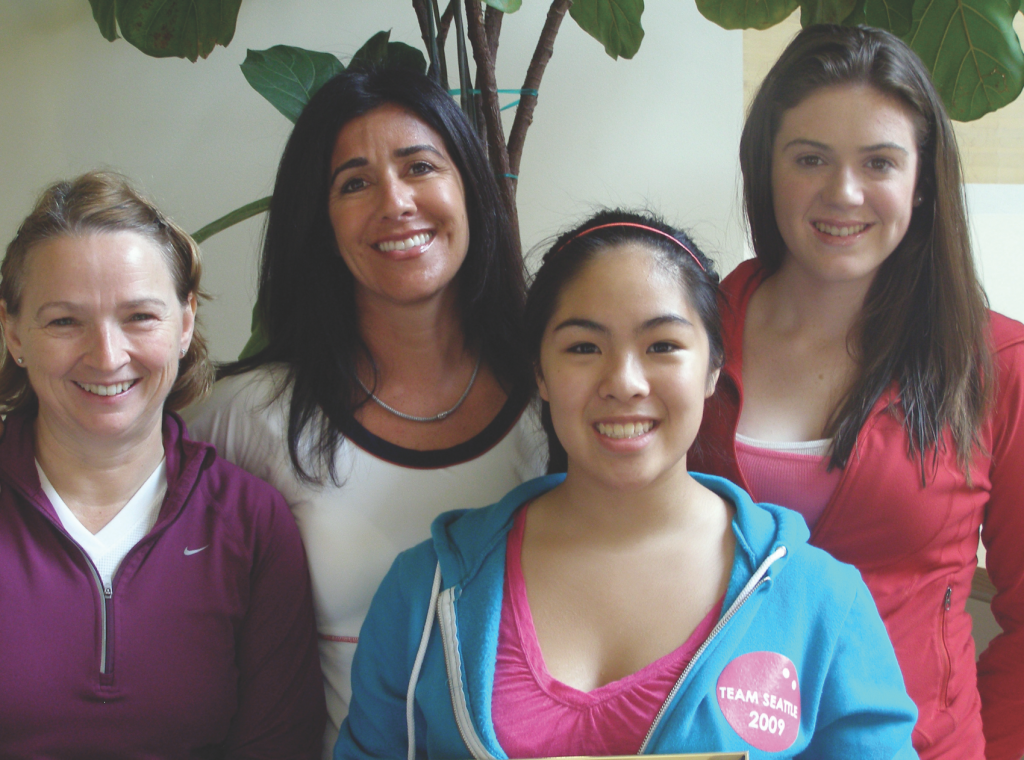
C Order of Finish: 1.Seattle 3 2.California 2 3.Philadelphia 4.Seattle C 5.California 1 6.California 3 7.Portland Mir Cats 8. Squashing Queens 9.Cincinnati 10.Boston 11.DC Squashers 12. Portland Miracles
National Capitol Defends in the D’s
With three returning players from last year’s D championship team, National Capitol was well positioned, in terms of experience, to defend their title. Undefeated in the three-team, four match round robin, National Capitol defeated California and Seattle twice, once each at 4-1 and at 3-2. Although Seattle finished second, No. 1 player Maureen Khan was undefeated. (She may have had the winning edge with her young sons coaching her.)
The champions were led by Wendy Hall who won all her matches. Mona Evans, who won her first Howe Cup last year after first competing in 1984, was equally ecstatic this year, although she is thinking about retiring from competition. “This only gets harder with each passing year,” the exuberant DC captain said, although she did win three of her four matches. “But even if I don’t play, I’ll come back to watch.”
Seattle edged out California for second place, winning each of their matches 3-2.
D Order of finish: 1.National Capitol 2. Seattle 3. California
Author’s note: Still unable to give up playing Howe Cup despite advancing age, weight gain and loss of fitness, this year I was invited to join the Philadelphia C team when they lost a player at the last minute. I want to give a shout out to my teammates—Catherine Popovitch, Patti Spackman, Sara Smythe and Alexa Holleran—for a great team effort in finishing third in the Cs.
Age and treachery have become less effective weapons against my younger opponents—California’s 14-year-old Rachel Scherman and Seattle’s 16-year-old Catherine Toyoshima both came away with victories against me. Although they did seem nonplussed when I won some games against them, and who could blame them? How could this graying, overweight, middle-aged woman who can’t run very well possibly win a game against their fitness, speed and technically well developed games? That is what I love about squash—a little strategy and some deft touch can go a long way. After three consecutive losses (I also lost to another seasoned player, Boston’s Betsey Johnson), the weekend ended on a high note when I did find some competitive mojo and won a five game match to clinch a third place finish for my tea.
Those Bates Women
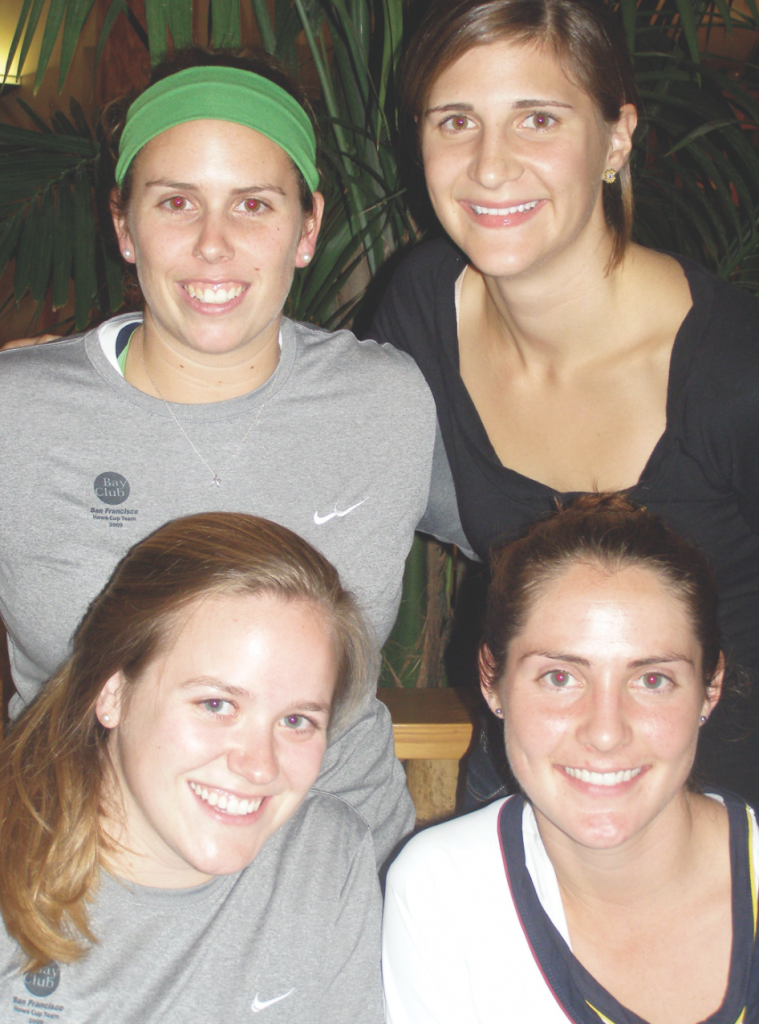
Who would have expected that the largest alumna representation in Howe Cup would be from a small college in Maine with 1700 students? The Bates Bobcats were well represented at this year’s championships by four alumnae whose love of squash was enhanced by their Bates experience—and found Howe Cup to be equally enjoyable.
“It snows until April at Bates, so it was really good to have a winter activity,” said 2006 grad Audrey Blanchette of the sport’s popularity. Audrey started her squash career at Tabor Academy and particularly enjoyed the camaraderie and closeness of the Bates squash teams. She didn’t play for more than a year after graduating, but picked up the game again when she moved to San Francisco. “It is a great way to meet people in a new city,” she explained. Her most notable impression of Howe Cup as a first time participant? “It was amazing to play someone who has been playing squash longer than I have been alive,” said the 24-year-old who played on the San Francisco Bay Club B team.
Audrey’s Howe Cup teammate Margot Webel picked up squash because her brothers played. After learning the game at the Piping Rock Club in Long Island, Margot went on to play competitively at the Taft School. “It has been really fun to see my former teammates,” Margot said of the Howe cup weekend. “I am very impressed by the fact that all these women keep playing.”
Kelsey Engman played No. 1 for the formidable Philadelphia A team—imagine playing No. 1 ahead of 10-time national singles champion Demer Holleran! Engman was a golfer who originally picked up squash at the Berwyn Club to maintain her golf swing. The squash bug took hold and Kelsey continued to play at Bates, where she really enjoyed her time on the team. “The Bates squash program has a lot of enthusiasm,” she noted. Just two and a half weeks before Howe Cup Kelsey moved to Stamford (CT) to be a teaching pro at Squash Alley.
Jenny Imrich started her squash career at Concord Academy where she was on the volleyball team and got recruited for squash because “the team needed one more player.” A native of Cambridge (MA), Jenny played for the Philadelphia B team at Howe Cup where she was surprised by the large number of women participating. “I often feel completely outnumbered by men in the squash world, so it is really nice to be playing in an event with all these women.”
Howe Cup Newbies
While there are many seasoned players who participate in Howe Cup, it is the new participants who bring a refreshing sense of discovery to the tournament each year.
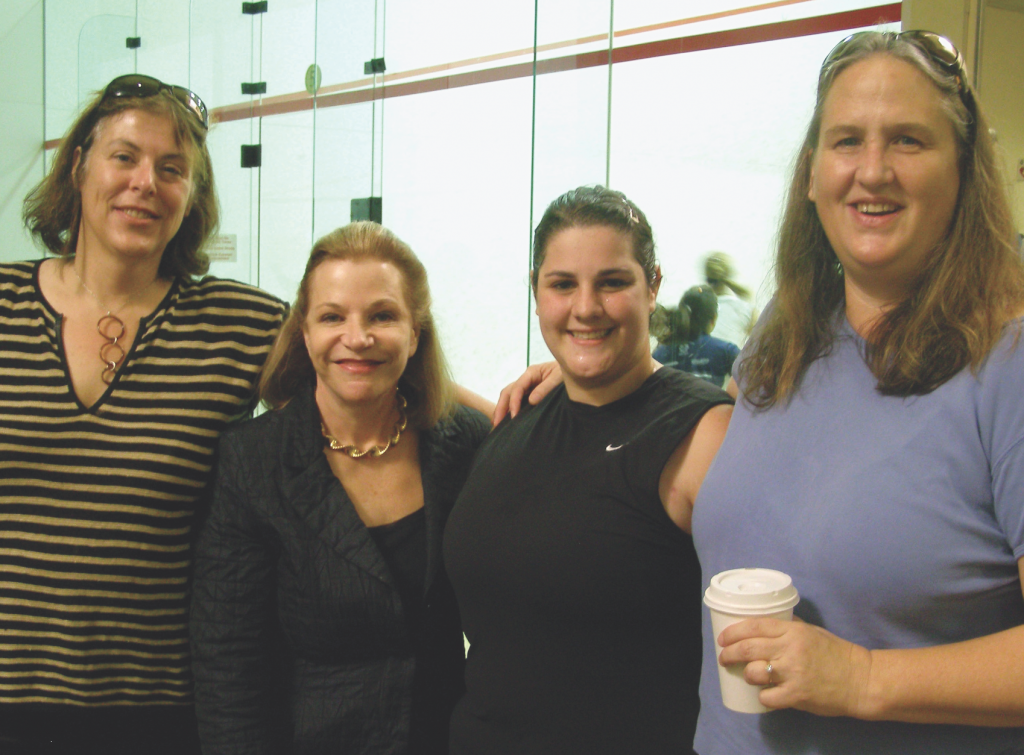
Annie Barouh first picked up a racquet at 13 and by the time she was16, Shabana Khan encouraged her to really get into the game. She has found squash to be a great motivational force on a few levels. “I have lost 25 pounds playing squash and cross training,” Annie says with obvious delight. “My goal is to be an A player by the time I graduate from college.” That means Annie has another year and a half to reach her goal. A junior at the University of Washington, Annie has challenged her way up to the men’s travel team. Even before the weekend was done, the exuberant Seattle native was already talking about playing next year. “I am having such a great time,” she said,” I have had great games—and it has felt so good to be out on the court with the crowd cheering.” She used her cell phone to send a picture of herself at the end of one of her matches to make sure that her coach Azam Khan knew that she had followed his directions. “Look, I got sweaty” was the text message.
Good friends Kathleen Dickenson and Carrie Greaves were lured into squash three years ago by the offer of a free 15 minute clinic at the Seattle Athletic Club, where they had been members for 10 years. “We had a blast,” said Kathleen, “and Ayub Khan really got us going.”
The two had heard great Howe Cup stories from the inimitable Lulu Chou, but were initially too intimidated to think about playing. “I had never won a single match in a tournament,” said Kathleen. Carrie corrected her. “That’s not true. You beat me once.” The women bolstered the courage to put themselves on the Howe Cup ladder at the club, and made the commitment to make the team with weekly team practices, a weekly lesson and a weekly women’s clinic. Soon after, they were on their way to Howe Cup on the Seattle D team.
By midday Saturday, they were enthralled with their Howe cup experience. The duo were buoyed by the team aspect of the event among the entire Seattle crowd, amazed that the Seattle C team came to watch their 8:30 AM match. “It has more than lived up to our expectations,” said Carrie. “We’re not Howe cup virgins anymore. And it has helped me get the monkey off my back with respect to my fear of competing.” They also enjoyed some celebrity spotting when they saw famous football player Jerry Rice in the Pacific Athletic Club. An added bonus for Carrie, “My father will be so impressed when I tell him that I played at Stanford.”


